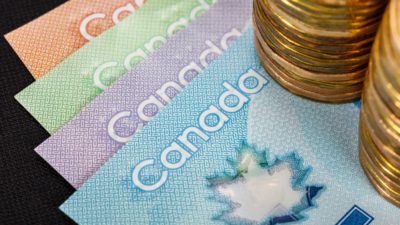If you had invested $6,500 in Air Canada (TSX:AC) stock in 2010, you would have about $67,350 today for annualized returns of close to 16.9% according to YCharts. That’s a market-beating return! That said, as shown in the graph below, the stock is highly volatile so it may not be a good buy-and-hold investment. Instead, investors need to be more selective about when they buy and sell the stock. You wouldn’t want to buy at a peak and be stuck in a position and sit on a potentially large loss that could take years to recover.

AC data by YCharts
Flying higher
The airline’s revenue is impacted by consumer discretionary spending. Additionally, the translation to the bottom line, or earnings, highly depends on the costs incurred. For example, in the first half of the year versus a year ago, Air Canada witnessed operating costs rising about 30% to $9.5 billion, a meaningful portion of which is aircraft fuel.
Other than the change in oil price and any hedges the company might have, the litres of fuel used based on the flight demand also affects the fuel cost incurred. Indeed, the flight demand was much higher and revenue passenger miles rose just over 55% to 40,195 million. The passenger load factor also improved to 86.4% from 74.7%.
This led to operating revenues that increased by 57% – at a higher rate than operating costs – to $10.3 billion. Ultimately, the operating profit in the first half of the year was $785 million versus a loss of $803 million in the prior-year period.
Air Canada reduced its debt levels versus the end of 2022 with its net debt falling to $5.3 billion versus $7.5 billion. Its second-quarter (Q2) interest expense was $5 million lower versus Q4 2022. Although the company has reduced its debt, its debt level is still high. For example, its debt-to-asset ratio was 102% at the end of Q2 versus 84% in 2019 – let’s call this the normalized levels. Interest rates have risen since 2022 as well.
Air Canada is a cyclical stock that’s sensitive to the economic cycle. For instance, during bad economic times, people and businesses are more reluctant to spend on traveling. The airline has a non-investment-grade credit rating of B+. So, at best, it could be considered a speculative trade.
Is it a good time to buy?
Investors can watch economic indicators to help determine when to buy. A relevant leading indicator is energy prices. So, if oil prices fall, it could lead to lower operating costs for Air Canada. A relevant coincident indicator is personal income. If personal income is rising at a good pace, it could be a positive for the company. A relevant lagging indicator may be the unemployment rate and inflation rate. So, if the unemployment rate and inflation rate were high, it could be a good time to fish for a bottom in Air Canada stock.
At $22.90 per share at writing, Air Canada stock trades at a discount of 27% from the 12-month analyst consensus price target. Technically, it has a support level at about $20–21 per share. If it’s able to hold this level, the stock could be a good short-term trade. Investors may want to explore other top TSX stocks first.








